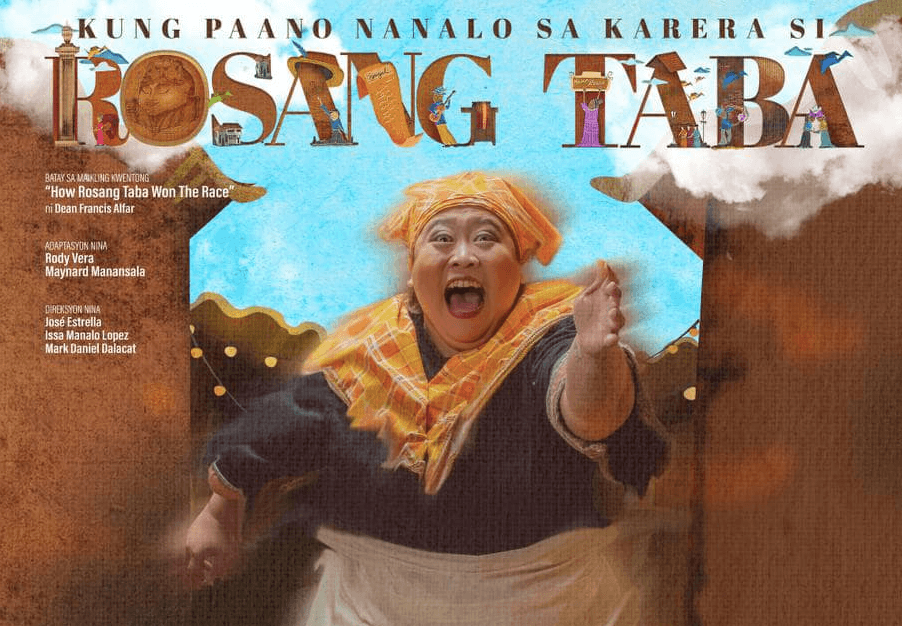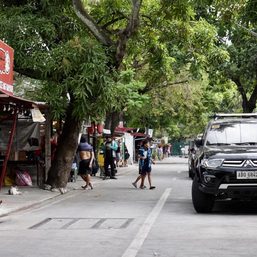SUMMARY
This is AI generated summarization, which may have errors. For context, always refer to the full article.

Dulaang UP’s Kung Paano Nanalo sa Karera si Rosang Taba, already in its fourth iteration, shares the plethora of hurdles one must overcome to complete, if not triumph in, a marathon. The first staging was a Zoom production back in December 2021, at the height of the global health threat, which, as we’re all aware, forced local theaters to halt operations. The next stride was another online production in June 2022, but with much effort and thought put into it. In 2023, the show finally graced the stage, marking the theater group’s comeback, which was among last year’s best.
This year’s staging is not without hiccups, after Dulaang UP calls off its opening run due to issues with logistics — issues that prove how Herculean of a task it is to mount stellar, fully-realized shows. But Rosang Taba soldiers on because of the community behind it: people offering what they can out of sheer kindness, people recognizing the function of solidarity in cultural work. How else can theater forge ways forward but through this sense of community?
The mishaps, however, seem to extend to the production itself, dwarfing the magic and wealth of experience the previous iteration has managed to access. The source material, Dean Francis Alfar’s Palanca-winning children’s story How Rosang Taba Won A Race, is fairly straightforward: House servant Rosang Taba (Kiki Baento) challenges the Spanish braggart Pietrado (Victor Sy), a close pal of the Gobernador Heneral (Jojo Cayabyab), to a foot race, following the young commander’s relentless mockery of her people, often with a grating, derisive laugh. Backing her up, much to her surprise, is the cunning wife of the governor, Seora Andreia (Meann Espinosa).
Rosang Taba is of course a story of and for the underdog. Anchoring on this dramatic trellis, playwrights Rody Vera and Maynard Manansala reinvent the text through a different vantage point, that of Rosang Taba’s descendants: Rosanna (Baento), Rosa Mia (Espinosa), and Rosalinda (Peewee O’Hara, also doubling as the titular character’s mother). The reframing makes way for the staging to toy with temporal distance, excavating both the contrasts and parallels between societies now and centuries ago.
And there’s really plenty to mine here: about how internalized fatphobia is a concession to larger patriarchal structures primed toward making the body as an object of ridicule, about how women are largely on the receiving end of gendered expectations, about how the hundred years under colonial rule have seeped into our ways of life — how we think of ourselves and our people.
But to some extent the show’s plotting, in its eagerness to obscure space and time, gets in the way of its message. At times, the silly, theatrical punchlines — TikTok dance crazes, references to pop music, the stuttering that borders on caricature — simply don’t work, if not take you out of a scene, most especially when the show uncoils the backstory. Halfway through it, you begin to notice the lull that lingers throughout the staging to the point of inducing sleep, which could’ve been remedied by Angel Dayao’s music that, much like last year’s, remains to be the show’s waterloo. In many ways, it doesn’t really clue us in on Rosang Taba’s anxieties and hopes, stripping the material of the texture it needs. O’Hara, at several junctures, also struggles with her lines.
It’s not that the staging is completely lackluster. If anything, it teems with life, thanks in large part to the production design by Mark Daniel Dalacat, who shares direction with José Estrella and Issa Manalo Lopez. Particularly scenic and rendered in sharp detail are his miniature sets (colonial homes and ships, for instance) mounted on trolleys, making the staging more lived-in. Carlo Pagunaling’s costume design, in its unfurling, bright-colored beauty, amps up this experience, just as Carlon Josol Motabato’s slick choreography does.
Meanwhile, Baento as Rosang Taba still cuts through, suffused with heart and excitement in the novel ways she draws out the animatedness of the character, while keeping her truth in perspective. But much like Skyzx Labastilla as Seora Andreia in the previous run, this year’s staging, at least as far as performance is concerned, belongs to Espinosa, chiefly because her part really has a lot to work with, and she harnesses it to come up with a dynamic, confident portrayal that somehow, whether wittingly or unwittingly, eclipses the rest of the cast.
But if we take last year’s staging as a point of reference, if not as a measuring rod, this latest run is far from a leap. Despite its flaws, though, Rosang Taba still knows better than to fixate on the notion of fatness its title carries. Instead, it extends its critique on broader, far more cruel systems that license this kind of violence in the first place. It looks back into our colonial past in hopes of forging new routes for its protagonist, for us. – Rappler.com
A filmed version of Rosang Taba will screen this May 9-10 at UP Visayas.
1 comment
How does this make you feel?




Any plans to show it somewhere south manila?